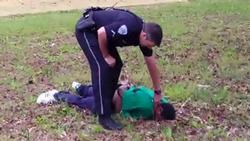Opinion
Racial understanding will not come from apologetics
By Cesar Renero ’17
April 10, 2015
On Wednesday, April 8, Heather MacDonald delivered a lecture entitled “Are Cops Racist?” which prompted a largely negative reaction from its audience. MacDonald is a noted fellow of the Manhattan Institute, a conservative think tank which helped pioneer the “broken windows theory” of crime-prevention. She ascribed racial-profiling to the prevalence of black-on-black crime, and repeatedly insisted that the only reason cops go out looking for young black men is that the most common perpetrators of violent crimes fit this description. Her blatantly apologist views were coolly met, and questions directed at her by the audience carried a critical tone. Moreover, MacDonald demonstrated the reactionary thinking with which the political right is responding to movements such as Black Lives Matter, and which only worsens the quagmire on the road to greater racial equality.
MacDonald’s speech carried a warning message, as she recognized the context under which she was addressing her diverse audience. To validate her claims, she pointed to her long-time residency in New York City and thorough study of police community meetings in areas such as the South Bronx and Harlem. Like most apologists, her claims seemed to be well-researched—almost always carrying the tinsel of statistics—but the basic logic she used was intrinsically wrong. Furthermore, she characterized incidents of police brutality as tragic “mistakes” on the part of individual officers and not a reflection of a greater systemic problem within the American police forces.
Among the students voicing dissent, Anthony Jackson ’15 countered that his problem lay “when you assume I am going to commit a crime,” based on his race. Jackson went on to compare how crimes such as domestic abuse and fraud do not have associated policies such as stop-and-frisk, noting that many or most perpetrators of these crimes are white. MacDonald at first held her composure, and offered imaginative regurgitations of the same logic and statistics, but by the end of the lecture, an awkward mood engulfed the room as MacDonald relied increasingly on conservative rhetorical tools to proffer an answer.
As a solution, MacDonald proposed that America should “re-constitute the family,” pointing to single-mothers and fatherlessness as the leading cause to the prevalence of crime in the black community. While I fully recognize that two loving parents are better than one, there is nothing in a father that makes him intrinsically a better parent than a mother. In fact, recent studies suggest that gay-and-lesbian couples may make even better parents than MacDonald’s traditional mom-and-dad power couple.
Worse of all, MacDonald’s solution feeds into the vitriolic cycle that is common in right-wing thought processes: a loss of morality on our part results in tangible physical costs, and the only solution is to go on a nostalgic gallop down memory lane and emulate our more righteous predecessors. From teen pregnancy to AIDS prevention, it seems that morals have been the perennial solution to the problems that the Right inherently cannot cope with. Much like the cure to teen pregnancy does not lie in fear of damnation, but in free condoms distributed by schools, the cure to black-on-black crime is not injecting men into single-mother households. Rather, we must see black-on-black crime as the result of a socioeconomic system that disproportionately affects people of color. While having a single mother is a factor of crime, the most impactful motive for crime is poverty. If you are poor and uneducated, you will more readily join a gang than will the daughter of Lorelai Gilmore, no matter how many parents you have.
Police brutality is a reality we must face, and the lack of accountability regarding the police’s use of force should be a worry to us all, even if MacDonald failed to address how these fatal “mistakes” should be resolved. But in a political climate which strings away from cordial disagreement and towards incisive and divisive shouting matches, we should be wary of inviting such polarizing speakers without providing a suitable medium for people to voice their criticism, such as a subsequent panel to discuss the issues raised by the lecture. We should strive towards creating dialogues where both opposing views have an equal voice. There is plenty to learn from the American Right, but only debate, discussion and conversation can dissolve that quagmire that sits on the road to greater understanding and equality. If we are to go down nostalgia highway, let it not be to salvage outdated ideologies, but to remember the eloquence and civility of Christopher Hitchens and William F. Buckley: we could chuckle away our political differences and come out knowing more about the other side, leading to understanding and, hopefully, progress.





